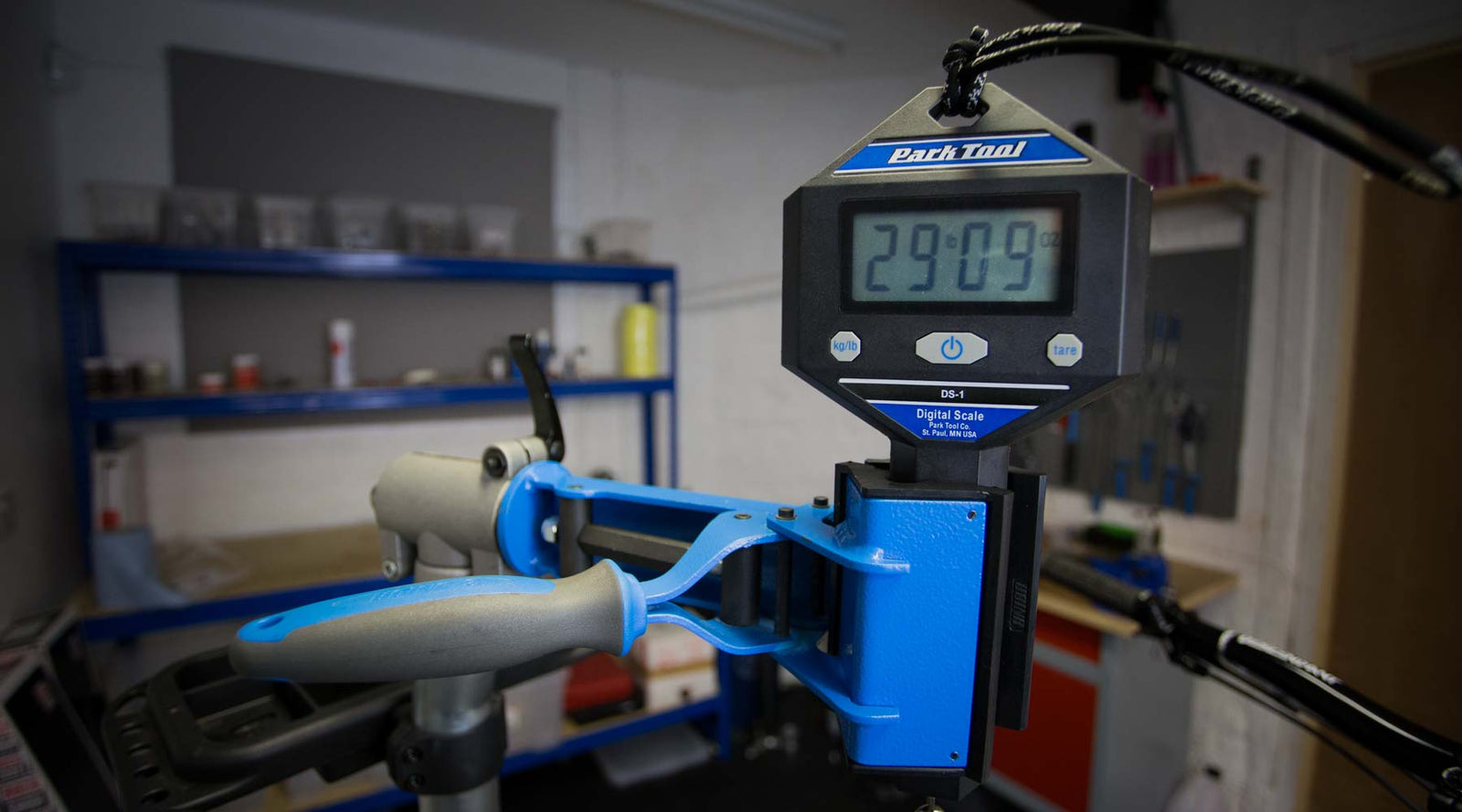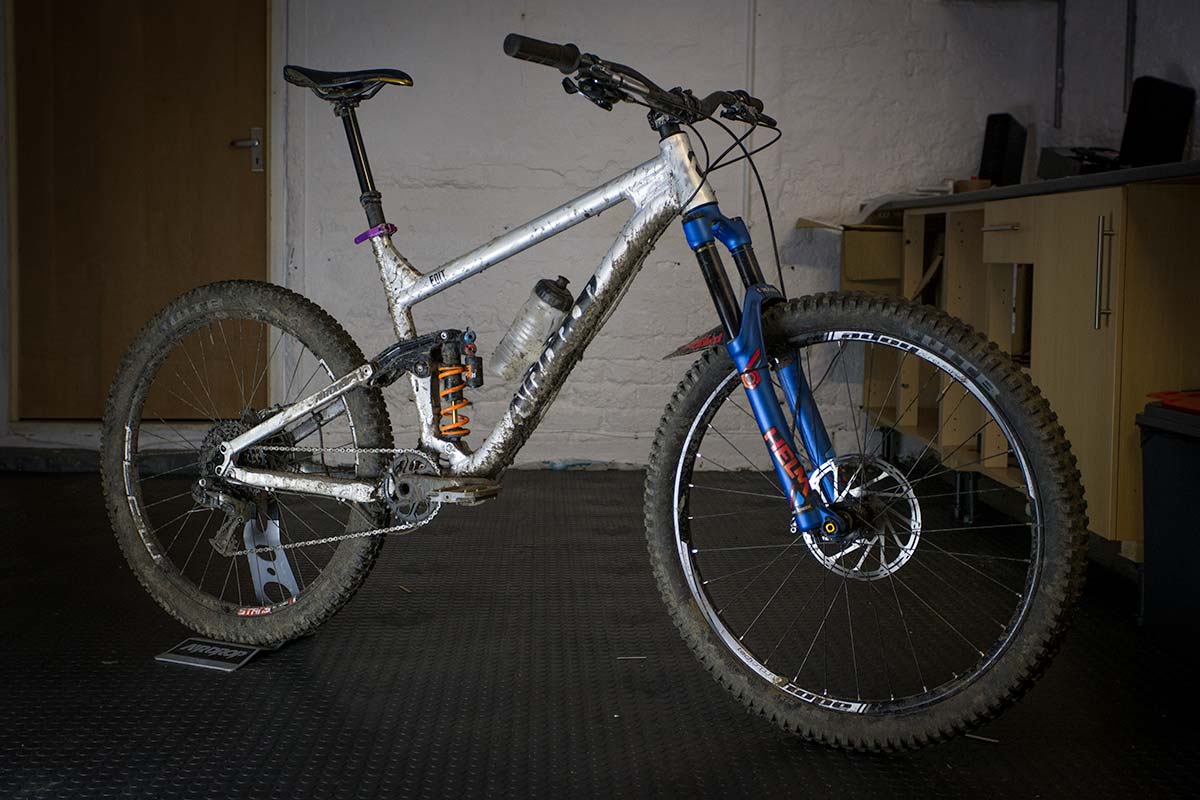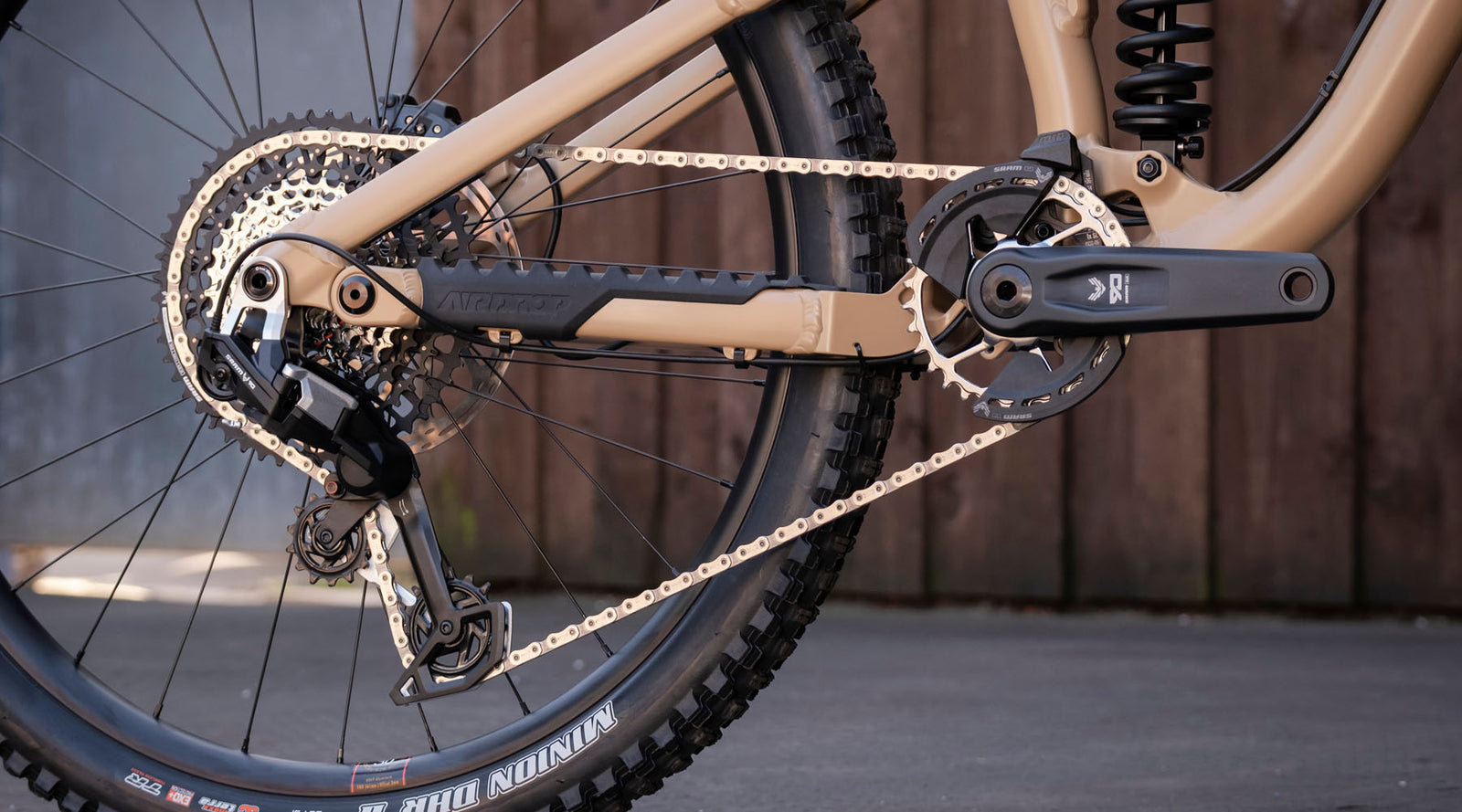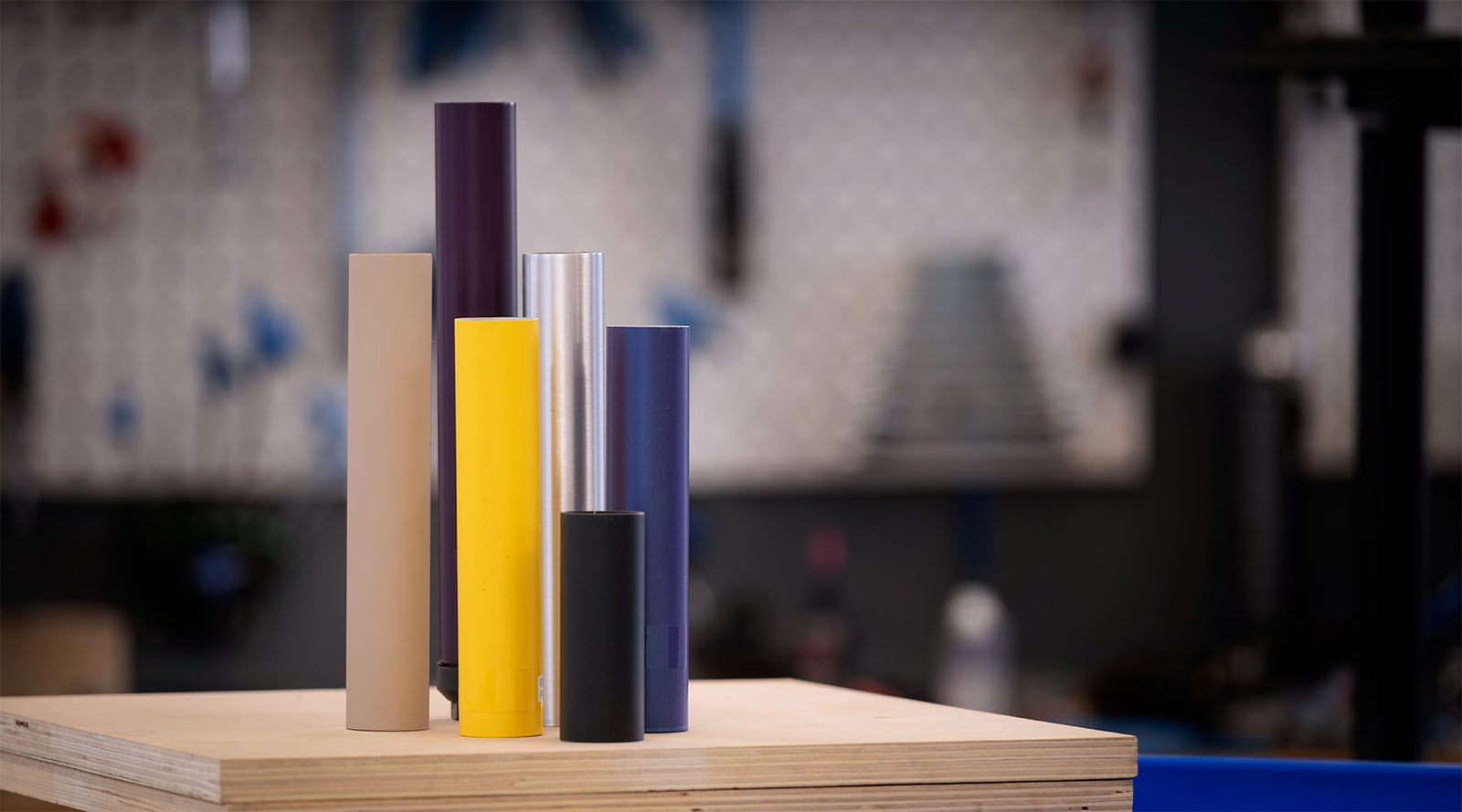
Weight Matters
September 13, 2017
How much does it weigh? It's the age-old question, and one we get asked a lot. What is this obsession with bike weight and should we even care?
As mountain bikers, our addiction to exotic plastics, titanium hardware and magnesium pedals knows no end. The lengths people will go to to save precious grammes is madness, not to mention the boatloads of cash some will part with in pursuit of the elusive sub 30lb all-mountain (not enduro) bike.
Personally, I just can’t understand it.
Here's what I think: weight is like Voldemort. He who must not be named should not be a consideration when buying your next bike. I'm not old enough to have lived through a generation of blasting down fire roads on rigid steel frames, with squealing cantis, purple anodising and fluorescent spandex. Maybe if I had I would be more sympathetic. Maybe back in the day it mattered, but this is 2017 not 1992 so let's lay it to rest. I do recall the brief period when mass produced carbon downhill bikes emerged and suddenly we jumped from riding 42lb monsters to 32lb slithers; that was short lived and all but a few bog dwellers have since moved on.
Now let's be a bit more serious about this. What we are doing now on our 150-160mm travel bikes is pretty different to that fire road bashing from the 90’s. In fact what we all expect our trail bikes to do now, not too long ago would have been reserved for world cup downhill. The sport has changed and so have the bikes we ride but still the obsession with weight remains. Is it really fair to expect a 160mm travel all-mountain bike that we're willing to chuck down a bike park to weigh the same as our old 125mm (XC) trail bikes?

Bikes today are complex beasts. So many factors affect the way a bike feels; geometry, suspension kinematics, damper setup, tyre compound, tyre pressure, frame flex/stiffness to name a few. All of which shape the ride and I would argue have a more profound effect than weight. I would challenge anyone to tell me the weight of a bike by riding it. I've been shocked more than once by bikes that I would certainly say rode light, to find out later they were in the 34lb region. On the other hand some bikes hug the ground and have a more surefooted, sluggish feel - some might say heavy - and come in at close to 28lbs. Realistically weight has very little bearing on the ride of your bike.
When we (Airdrop) are developing a bike weight is not at the top of the priority list. We focus on how the bike rides, not what looks good on paper. Factors such as geometry, kinematics and longevity are much more important to us, and we think they should be to you too. Weight is very much the result of a product that hits the key performance points we were aiming for. If we aim for a certain weight, should we sacrifice strength, stiffness or durability to get there?
The Bigger Picture
I've been giving a lot of thought to how the weight of a bike fits in to the bigger picture. I think we'd all be happy with a modern all-mountain bike at around the 30lb mark, but 34lb... oh dear god that’s too heavy! What difference does 4lb on the bike really make?
Bike = 30lb (13.6kg)
Rider weight = 187lb (85kg)
Backpack = 9lb (4kg)
Mud = 4lb (1.8kg)
Total Weight = 230lb (104.4kg)
Bike = 34lb (15.4kg)
Rider weight = 187lb (85kg)
Backpack = 9lb (4kg)
Mud = 4lb (1.8kg)
Total Weight = 234lb (106.1kg)
I weigh in at 187lb (85kg) in riding gear. If I take a bag that’s another 9lb (4kg), the bike 30lb (13.6kg) and this is the UK - it's filthy out there - so another 4lb (1.8kg) of mud. So now as a whole bike, rider and gear plastered in mother nature's finest we weigh in at a whopping 230lb (104.4kg). If my bike was to weigh 34lb - the bike being 14% heavier - that would be a total weight increase of only 1.74%. Now I don’t have any science to prove how many watts you will lose dragging 1.74% more weight or how much slower (or faster) you might be over a 5 minute descent, or how much less satisfying that would be, or if I've got my numbers right. But 1.74% doesn't seem like that big a deal to me.
I guess what it all boils down to really is weight is something we can all understand. It's simple just a number after all. The lower the number, the better it is. Right? We are like impressionable teens, and the bike industry is that dodgy friend your parents warned you of, whispering in your ear weight matters. Weight is that gateway drug that leads to more exotic substances. Weight is an easy upsell for the industry if we all believe in its importance; it’s a license to make products with exotic materials and to charge the earth all in pursuit of shaving grammes with a questionable performance gain. Going back to our total weight calculation, wouldn't it be just as beneficial - maybe more so - to lose the 4lb off our own spare tyres? The trouble is, that's hard work and you can't buy it in a shop. Or spend that money on coaching which definitely will make you faster.
We are currently locked in to this never ending circle; the industry tell us weight matters, we believe that and buy those gram saving products, now there is demand so industry makes more of those products, now those products need marketing and I'm a sucker for anything with matte packaging and gloss branding...
Anyhow I guess what you really want know is how much does an Edit v2 weigh. Well frame only it's 7.5lb (3.4kg) and depending on how you build it anywhere from 30lb to 34lb all-in. My own bike weighs 34lb, and I don't care.
So let's all just agree to stop whining about weight, crack on and just ride our bikes. I can guarantee there is no correlation between weight and smiles.
James Crossland
James grew up in Sheffield and Wharncliffe is his local. He spent a few years guiding in NZ but now he's back, helping with all things Airdrop.
4 Responses
Murat Ali Gunes
September 16, 2017
Well I think weight matters, but not only when you are riding. If you need to climb for 2 hours on and off the bike before you get to descend then I promise you will notice every 100 grams :) But again, making a bike lighter shouldn’t take the downhill fun out of the ride. And I will say, I could appreciate if the Edit frames were 200 grams lighter but then maybe they wouldn’t be this good down the road. Now what I am planning to do is getting a v2 frame and building it with the lightest enduro-grade parts I have and get it under 30 lbs and see if that will be even better than my 33 lbs v1 :)
James Turner
September 13, 2017
I used to ride a 140 travel carbon trail bike with carbon wheels. It weighed 26.5 lbs.
First time round Llandegla on my Edit weighing 30lbs = 33 Strava pb’s
Can’t say fairer than that…..
Anthony Harrison
September 13, 2017
Thank God. I now feel at ease with the world! I have no idea how much my v1 weighs and don’t even care. I love riding it, it looks good and folk always comment. Happy me.
Leave a comment
Comments will be approved before showing up.
Also in Airdrop Bikes Blog

90 Series Transmission
March 27, 2025
SRAM just launched the new 90 Series Transmission. All the advantages of T-Type full mount drivetrain with the reliability of mechanical shifting? Sounds good. It's already available on the Edit MX...

New Frame Colours
February 18, 2025
With new batches of Edits and Slackers coming in (Fades just arrived), we've taken the opportunity to freshen things up with new colours.
Read More

Introducing Alf Raynor
February 12, 2025
We're stoked to announce that Alf Raynor is riding for Airdrop Bikes. Alf is likely the hardest man in MTB, he loves the Graft and goes hard on the build. His Raw style on the bike and commitment is something that has to be seen to believed; it's wild.
Email Newsletter
Our monthly email newsletter gets you access to all the good stuff before everyone else.
Get The Inside Line
We're always working on stuff behind the scenes and we'd like to share those stories with you. One email a month, and we make it worth a read.
Sign up to get the inside line.

Barnaby Tompkins
September 27, 2017
Assuming “frame only it’s 7.5lb (3.4kg)” is without shock – correct?